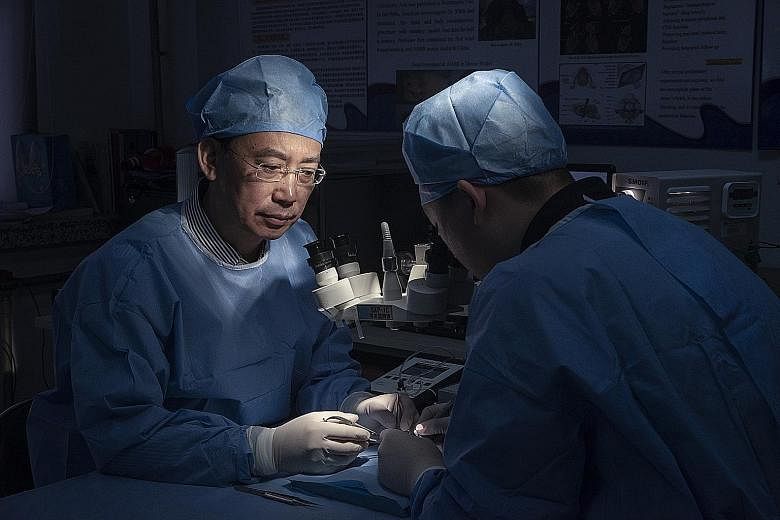HARBIN • Six years ago, Mr Wang Huanming was paralysed from the neck down after being injured wrestling with a friend. Today, he hopes he has found the answer to walking again: a new body for his head.
Mr Wang, a 62-year-old retired gas company worker, is one of several people in China who have volunteered for a body transplant at a hospital in the northern Chinese city of Harbin.
The idea for a body transplant is the kind of thinking that has experts around the world alarmed at how far China is pushing the ethical and practical limits of science.
Such a transplant is impossible, at least for now, according to leading doctors and experts, including some in China, who point to the difficulty of connecting nerves in the spinal cord. Failure would mean the death of the patient.
The orthopaedic surgeon proposing the operation, Dr Ren Xiaoping of Harbin Medical University, who assisted in the first hand transplant in the United States in 1999, said he would not be deterred.
In an interview, Dr Ren said that he was building a team, that research was under way and that the operation would take place "when we are ready".
His plan: Remove two heads from two bodies, connect the blood vessels of the body of the deceased donor and the recipient head, insert a metal plate to stabilise the new neck, bathe the spinal cord nerve endings in a glue-like substance to aid regrowth, then sew up the skin.
Whether or not he performs the operation, leading medical experts have condemned the plan.
"For most people, it's at best premature and at worst reckless," said Dr James Bernat, a professor of neurology and medicine at the Geisel School of Medicine of Dartmouth College in the United States.
Dr Huang Jiefu, a former deputy minister of health in China, said in an interview in November that when the spine is cut, the neurons "cannot be reconnected, so it's scientifically impossible".
He added: "Ethically, it's impossible. How can you put one person's head on another's body?"
Critics attribute such medical experimentation in China to national ambition, generous state funding, a utilitarian world-view that prioritises results, and a lack of accountability to the outside world.
The Chinese government invested 1.42 trillion yuan (S$294 billion) in scientific research and development last year, compared with 245 billion yuan in 2005, according to the National Bureau of Statistics.
Dr Ren is not the only one exploring body transplants. Dr Sergio Canavero of the Turin Advanced Neuromodulation Group in Italy is a prominent advocate, and scientists at the Institute of Theoretical and Experimental Biophysics at the Russian Academy of Sciences are researching aspects of the procedure.
Neither Dr Canavero nor the Russian institute has plans to carry it out, though, they say. Dr Ren has experimented with head transplants on mice but they have lived for only a day. He said he had also begun practising on human cadavers, but declined to give details.
The doctor and his supporters say the operation could help people with potentially fatal diseases affecting body function, such as spinal muscular atrophy, as well as those with paralysis.
"Whether it's ethical or not, this is a person's life," Dr Ren said. "There is nothing higher than a life and that's the core of ethics."
Asked to comment, China's Health Commission said surgeons were required to abide by ethical responsibilities outlined in the nation's human organ transplant regulations.
Amid the medical and ethical uncertainties, Mr Wang and his family cling to hope.
"A medical procedure that sounds impossible may save us," his daughter said.
NEW YORK TIMES


